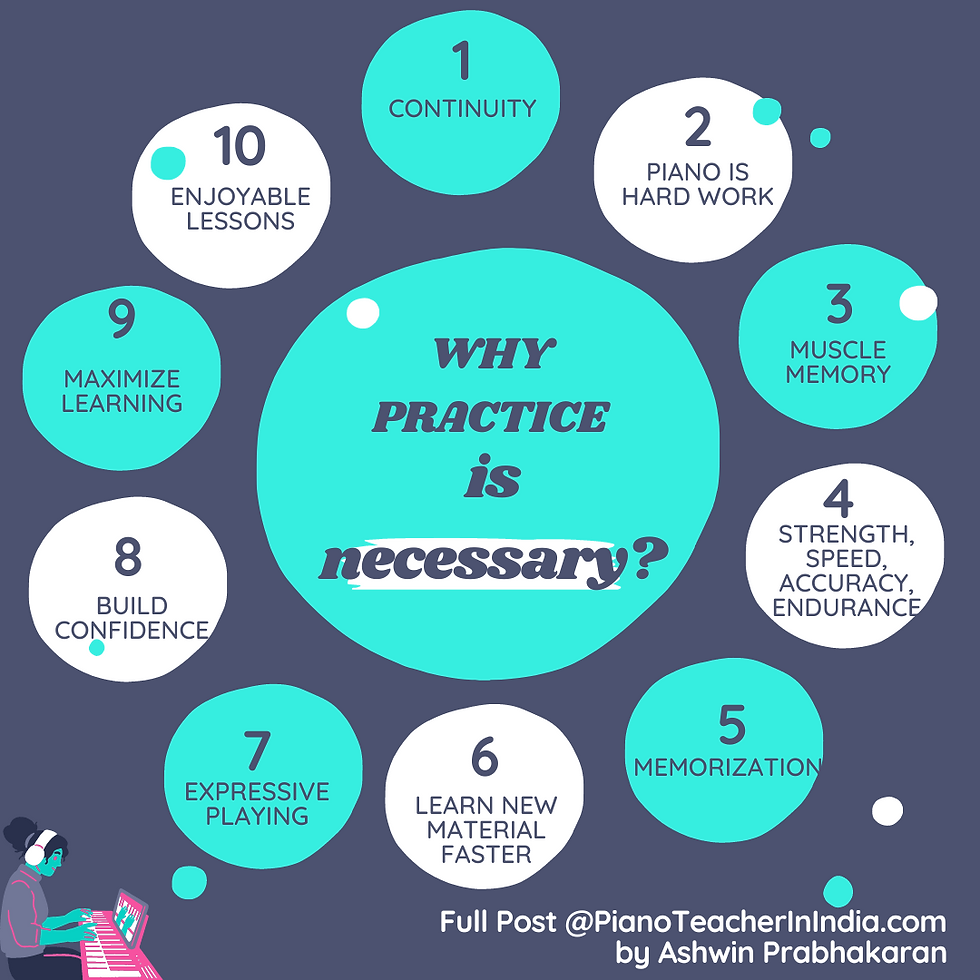WHY PRACTICE IS NECESSARY!!!
- Ashwin Prabhakaran
- May 11, 2023
- 3 min read

Piano Learning (or any Instrument Learning for that matter) is practice intensive.
One often hears stories of teachers from the past only taking in students after the student already had an instrument to practice on. In effect, they wanted to make sure that the students could PRACTICE what was going to be taught before the even started lessons.
Let us unpack why Practice is necessary for piano playing:
1. CONTINUITY: Typically Piano Lessons are held once a week. The student is expected to visit and revisit the Pieces, Technical Work, Theoretical Concepts, etc over the week so that the teacher can build on the skills developed in the prior lesson. The Brain needs a whole bunch of repetitions before in take effectively take on new information to build upon. Only with practice can the Learning Continuity happen.
2. PLAYING THE PIANO IS HARD WORK: Expanding on the point above, playing the Piano requires one to use and move the fingers, hands, arms, shoulders, back, feet, etc in ways that we don't use for any other activity; and coordination between the hands adds another layer of difficulty. Practicing Daily is the only way to train the body to get used to the movements and coordination required for Piano Playing.
3. MUSCLE MEMORY: Have you ever seen professional Pianists perform their pieces? Doesn't it look effortless when they play? This level of proficiency is achieved only through hours and hours of rigorous practice to build muscle memory so that the hands, fingers, arm move without conscious effort.
4. STRENGTH, SPEED, ACCURACY, ENDURANCE: Music by Master Composers challenges the performer at several levels. Some of the Pieces are just too long, some are just too fast, some are just difficult to remember, some are difficult to play; and often pieces are a mix of the above. The Pieces at the earliest levels of Piano learning are building blocks that help students tackle these later challenges.
5. MEMORIZATION: A big part of the Piano Learning journey is to be able to perform from memory. This does not happen overnight. One must intentionally practice memorization. Just developing Muscle Memory is not equal to Memorization
6. LEARN NEW MATERIAL FASTER: Learning new music requires a combination of skills, including reading music notation, understanding musical theory and harmony, and developing musical interpretation. Regular practice helps pianists to master these skills and to learn new pieces of music efficiently and faster.
7. EXPRESSIVE PLAYING: As the fingers, hands and feet become more comfortable and efficient at playing the music through repeated practice, the student reaches a stage where they can begin to focus on other aspects of performance, such as expression and interpretation. This stage also requires careful, meticulous and thoughtful practice.
8. BUILDS CONFIDENCE: Regular practice helps to build confidence in piano playing. By practicing regularly and seeing improvement over time, pianists gain confidence in their abilities, which can lead to greater enjoyment and fulfillment in playing the piano.
9. MAXIMIZE LEARNING: This is purely a pragmatic point. When a student hasn't practiced, the teacher will have to repeat the same material over and over again instead of doing something new. There no value for money!!!
10. ENJOYABLE, EXCITING AND MOTIVATED LESSONS: As someone who has taught for nearly two decades, I can definitely say that I do not look forward to teaching students who seldom practice. The lessons feel dull, boring and disappointing It feels as if I am lugging around dead-weight that just gets heavier by the minute.
Students must remember that learning the Piano is a collaborative effort and a Practice is that currency that helps make lessons super enjoyable for both students and teacher.
I know from personal experience (and I am sure that my colleagues would agree) that working with students who regularly practice is such a joy for the teacher, and we look forward to those lessons. We even go the extra mile to bring new and exciting challenges for the student to learn and overcome.
In conclusion, PRACTICE = PROGRESS (yes, there are more nuances, but I guess it makes the point)


.jpeg)

Comments